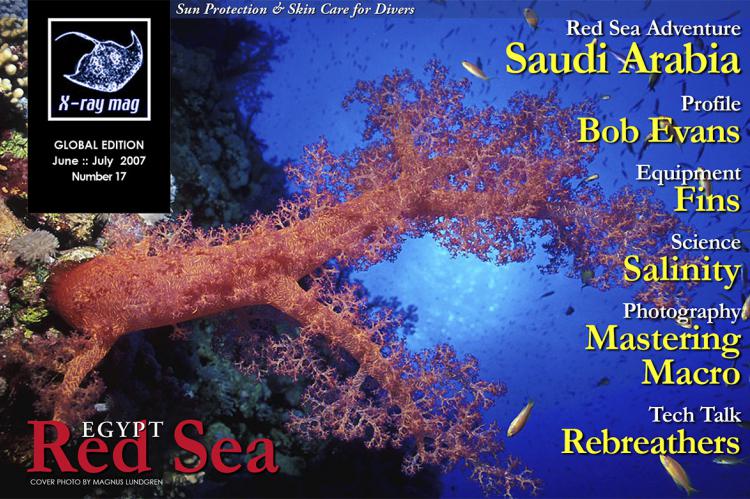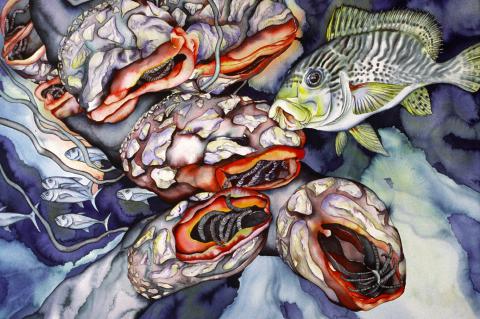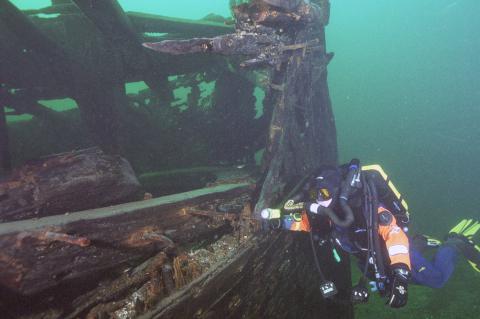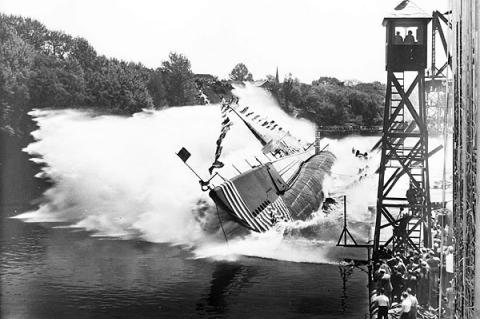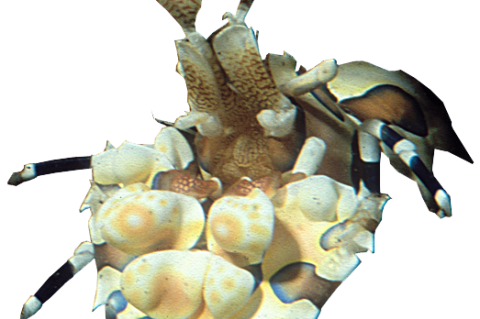X-Ray Mag #17
Red Sea - behind the scene Egypt and Saudi Arabia. FINS + interview of Bob Evans. How coral reefs change. Kurt Amslers photoschool: Macro. Safety margins on a rebreather. The Science of Salinity. Sun protection for divers. Mermaid Matters: Mascara: Medical issues: Nasal Irrigation
Main features in this issue include:
Bob Evans
Our talks with Bob Evans were just full of good ole plain fun, with lots of laughs and entertaining anecdotes, yet serious and focused on the subject. From the first impression, he was open, welcoming and very conversational.
When were you first attracted to the ocean?
Fins
Fins provide a great way to get from point A to point B in an H2O environment. In fact, with few exceptions, it is the only way to get around with ease while diving.
As a diver you are limited by your strength and stamina. This is when the design of the fin really can work for you. If you are an able-bodied, strong person, you will have little problem with whatever fin you happen to wear. A good blade design will merely fine tune your performance. But if you know your stamina is low, and it has been some time since you visited a gym, choosing the right fin can make all the difference between a bad or good experience. However, it is easy to get confused. Fin designs have evolved over the years.
Liduine Bekman
It was inevitable that the ocean became the main focus of my painting. I started diving, and over the years, the ocean became part of my soul. I am forever fascinated by the seemingly limitless variety and ultimate complexity of the sea creatures I encounter and never cease to be intrigued by the beauty of the colors and the many shapes—everything from soft and ethereal, to stark and threatening.
Bekman said, “I was always fascinated by nature and its beauty. In my family, museum and gallery visits were common, and my family taught me to really see things through careful observation.” The ocean was very much part of Bekman’s childhood.
Rea Sea: Southern Egypt to Sudan
There is something special about it, the Red Sea, that I have not found anywhere else on the planet.
Despite its relative proximity to Europe and the ever increasing convenience and affordability of cheap direct flights, once you head out of the resort areas, you can still wander off and turn around the next corner, or anchor behind the next reef and see no other people or boats in the horizon—n
Safety Margins on a Rebreather
There used to be a time when there was no safety margin in any activity that the human being wanted to participate in. In a merciless prehistoric world, on a daily basis, the cave men were hunting with stones and sticks, a large variety of predators the size of a truck, expecting to feed a hungry family. Then, Winchester gave men the ability to kill wild animals while staying at a comfortable distance, without risking their lives.
There used to be a time when there was no safety margin in any activity that the human being wanted to participate in.
U-Boats - Separating Cultural Myth from Historical Reality
Interpreting artifacts is the most important aspect of archaeology—either on land or underwater. Deciding what an artifact is, or rather—what it was, can be tricky though.
Who built it and why? How was it used? Why did it end up where it did?
On land, artifacts from different periods can get mixed up. And, most artifacts recovered from sites on land are mere remnants— broken bits and pieces that were either thrown away intentionally or were left behind accidentally.
Water - A Unique Solvent
Water is obviously important as a basic necessity for maintaining life. Quite simply, if you don’t regularly take in water you can die within a few days.
In a completely different context, this ability also enables us, for example, to keep ourselves and our clothes clean and free from pathological bacteria, thus helping us to maintain good health.
Why and how ecosystems change
Across the globe, coral reefs are in peril—this is already old news. Man-made stresses—overfishing, pollution and climate change—has sent even pristine coral reefs around the world into a drastic decline causing major changes in ecosystem structure.
The extent to which alternate states are stable or reversible is presently not well understood. Such a process during which an otherwise stable ecosystem changes into another stable state is called a phase shift.


